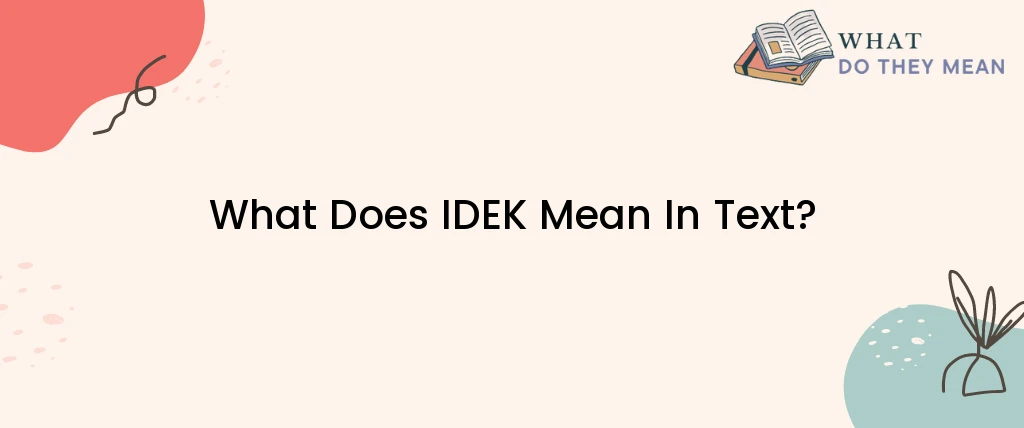IDEK” stands for “I don’t even know.” In the world of texting and online communication, acronyms are a popular way to convey meaning in a quick and efficient manner. One such acronym is “IDEK,” which is used to indicate a lack of knowledge or understanding of a particular topic. In this article, we’ll explore the meaning of IDEK in more detail, including its origins, usage, and variations.
What Does IDEK Stand For?
IDEK is an abbreviation for the phrase “I don’t even know.” It’s similar to the acronym “IDK,” which stands for “I don’t know.” However, IDEK is used when the speaker is even more uncertain or clueless about a topic than they would be if they simply didn’t know the answer.
Origins of IDEK
Like many online acronyms, the exact origins of IDEK are difficult to trace. However, it’s likely that it emerged from the same internet culture that gave rise to other popular acronyms like LOL (“laugh out loud”) and OMG (“oh my god”). In general, these acronyms are meant to convey a sense of informality and casualness, as well as a desire for quick and easy communication.
Usage of IDEK
IDEK is typically used in response to a question or statement that the speaker doesn’t have a clear answer to. For example, if someone asks you what the capital of Burkina Faso is, and you have no idea, you might respond with “IDEK.” This indicates that you not only don’t know the answer, but you’re not even sure where to begin looking for it.
In some cases, IDEK can also be used to express frustration or confusion. For example, if someone tells you a particularly complicated story or asks you a convoluted question, you might respond with “IDEK” to convey that you’re feeling overwhelmed or unable to process the information.
Overall, the tone of IDEK is generally more casual and informal than other expressions of uncertainty, like “I’m not sure” or “I have no idea.” It’s a way of acknowledging your lack of knowledge in a more lighthearted and playful way.
Variations of IDEK
Like many online acronyms, IDEK has spawned a number of variations and alternate spellings. Some of the most common include:
- IDK: As mentioned earlier, this acronym stands for “I don’t know” and is a more general expression of uncertainty than IDEK.
- IDC: This acronym stands for “I don’t care” and is often used to dismiss something that the speaker finds unimportant or irrelevant.
- IDGAF: This acronym stands for “I don’t give a f***” and is an even stronger expression of apathy or indifference than IDC.
- IDRK: This acronym stands for “I don’t really know” and is a less emphatic version of IDEK. It suggests that the speaker has some knowledge or understanding of the topic, but not enough to provide a definitive answer.
- IDEC: This acronym stands for “I don’t even care” and is similar to IDEK but with a slightly more negative connotation. It suggests that the speaker not only doesn’t know the answer but also doesn’t particularly care about finding out.
Conclusion
In summary, IDEK is an online acronym that stands for “I don’t even know.” It’s used to indicate a lack of knowledge or understanding of a particular topic and is often employed in a casual and lighthearted way. While it’s not a formal or proper way to express uncertainty, IDEK has become a popular way to communicate informally in online environments like social media and text messaging. Its variations and alternate spellings further demonstrate the flexibility and adaptability of online language.
As with any online communication, it’s important to consider your audience and context when using acronyms like IDEK. While it may be appropriate in casual conversations with friends, it may not be appropriate in more formal or professional settings. It’s always a good idea to err on the side of caution and use more traditional expressions of uncertainty when in doubt.
In conclusion, IDEK is a widely used acronym in online communication that expresses a lack of knowledge or understanding of a particular topic. It’s part of a larger online language culture that emphasizes informality and quick communication and has spawned a variety of variations and alternate spellings. As with any language, it’s important to consider your audience and context when using IDEK to ensure that you’re communicating effectively and appropriately.

As a researcher, I am curious and driven by the pursuit of knowledge. I approach my work with a critical eye, carefully evaluating sources and methods to ensure that my findings are accurate and reliable. Whether delving into scientific studies, historical records, or cutting-edge technologies, I am always seeking to expand my understanding and make new discoveries. I am dedicated to uncovering new insights and finding solutions to complex problems, and am driven by a passion for uncovering the truth.

